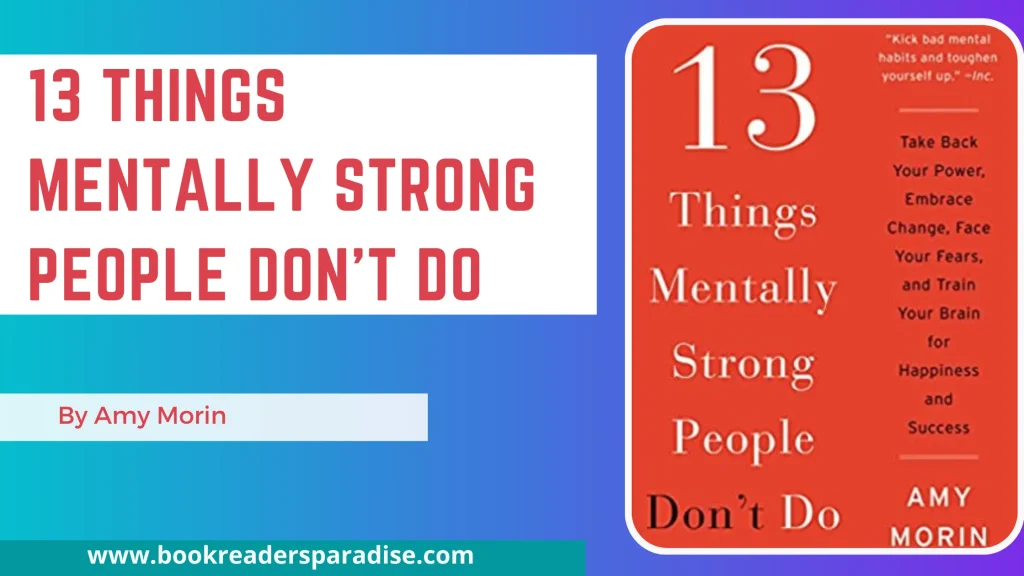Introducing the book “13 Things Mental Strong People Don’t Do” – An insightful guide to building emotional resilience and strength. Through this book, you will discover the 13 things that mentally strong people avoid doing to maintain a positive outlook in life, be it in their personal or professional life.
Each chapter of the book provides in-depth insights into each of these 13 things, offering practical strategies and tips to strengthen your mental toughness and overcome life’s challenges. From not dwelling on the past to not focusing on things they can’t control, each of these things forms a crucial component of building a mentally strong personality.
In this blog post, we’ll provide a brief overview of each of these 13 things to give you a sense of how this book can help you develop the mental strength and resilience you need.
Title 13 Things Mentally Strong People Don’t Do Author Amy Morin Publication Date 7 March 2017 Genre Psychology ISBN 0062358308 Language English Total Pages 288 Audiobook Duration 6 hours 37 minutes Rating
Also Read: 59 Seconds PDF, Summary, Audiobook
What is the 13 Things Mentally Strong People Don’t Do PDF Book About?
“13 Things Mental Strong People Don’t Do” is an insightful book that provides practical tips and strategies for building emotional resilience and strength. It explores the 13 things that mentally strong people avoid doing to maintain a positive outlook in life, be it in their personal or professional life.
These things range from not wasting time feeling sorry for oneself to not dwelling on the past, each forming a crucial component of building a mentally strong personality. By eliminating negative patterns and habits that hold us back, we can achieve our full potential and lead a more fulfilling life.
Also read: 80-20 internet lead generation
Who is the author of the book 13 Things Mentally Strong People Don’t Do? – Amy Morin
Amy Morin is an American author, speaker, psychotherapist, and podcaster. As the Editor-in-Chief of Verywell Mind, she helps people better understand mental health and wellness. She is best known for her bestselling book “13 Things Mentally Strong People Don’t Do,” which has helped countless readers develop better emotional resilience.
Amy Morin also hosts The Verywell Mind Podcast, where she shares expert advice and practical tips for improving mental health. She has delivered one of the most popular TEDx talks of all time, and her work has been acclaimed by The Guardian magazine, which called her the self-help guru of the moment
Also read: 12 Rules for Life PDF, Summary, Audiobook
Who Can Benefit from the 13 Things Mentally Strong People Don’t Do PDF Book?
“13 Things Mental Strong People Don’t Do” is an excellent guidebook that can benefit anyone who wants to improve their mental strength and emotional resilience. From corporate executives to stay-at-home parents, anyone can apply the strategies outlined in this book to their lives.
If you’re struggling with self-doubt, anxiety, or depression, this book can provide you with practical tools to overcome life’s challenges. Even if you’re not facing difficult times, the book can help you build better habits and develop a positive outlook on life.
With simple, actionable advice and relatable real-world examples, the book is easy to follow and implement. Whether you’re looking to start your own business or just want to be a more effective leader, this book is worth your time.
13 Things Mentally Strong People Don’t Do PDF, Summary & Book Review
Also read: 10% Happier PDF, Summary, Audiobook FREE Download Details
5 Examples Of Mental Strength And Embracing Change
Life is full of change, and it can be difficult to adjust to the unexpected. However, with the right mental fortitude and resilience, we can embrace change and find success.
In this blog post, we will explore five instances in which people have utilized mental strength to overcome obstacles and embrace change. From gratitude to resilience and risk-taking, we will examine some of the best tales of strength and courage.
By the end of this post, you should have a better comprehension of how to utilize mental strength and resilience to find success.
Mental Strength
Mental strength is essential for overcoming tragedy and reaching one’s greatest potential. Life may throw curveballs, but mentally strong individuals do not let such moments hinder their progress. Instead, they focus on gratitude, rather than self-pity.
Developing mental strength entails recognizing harmful habits that impede progress in life and learning the 13 things mentally strong people do not do, such as wasting time feeling sorry for themselves or giving away their power by dwelling on past mistakes.
Practicing gratitude can improve physical health, and it is essential to maintain a positive attitude, even in the face of major hardships like illness or death.
An inspiring example of how cultivating mental strength by focusing on what one has versus grieving over losses can turn tragedy into triumph is Marla Runyon. Despite being legally blind due to Stargardt’s Disease, she went on to set world records at the 1992 and 1996 Paralympics!
By embracing change with courage, resilience, adaptability, flexibility, and growth, Marla was able to make her dreams come true, no matter what obstacles stood in her way.
It is crucial not to forget that everyone experiences suffering in their lives at some point. However, it does not mean that we have to give up hope or lose our sense of purpose along the way! Taking a moment every day to practice gratitude for even the smallest blessings will help individuals become mentally stronger. They can rise above any challenge life throws their way!
The Benefits Of Gratefulness, Mental Strength And Forgiveness
Mental strength is a crucial component of leading a successful life, and there are numerous methods to cultivate it. Expressing gratitude, practicing forgiveness, and embracing change are all excellent examples of mental strength that can help you become more resilient and better equipped to handle life’s challenges. Let’s explore each of these in greater detail.
Gratitude is a way to strengthen your mind and build resilience. According to a 2003 study published in Personality and Social Psychology, expressing gratitude leads to better physical health, increased exercise, improved sleep quality, and overall healthier living than those who are ungrateful.
This can be accomplished by focusing on what you already have rather than what you don’t have or what others possess. Additionally, it’s beneficial to focus on the positive when faced with difficult situations or problems, rather than the negative, as it will help increase your spirits.
Mentally strong individuals refuse to allow others to control their thoughts or actions. Instead of saying things like “he made me mad,” it’s preferable to say “I’m choosing to stay late.” This assists us in taking responsibility for our own actions instead of blaming someone else for our emotions or decisions.
Practicing forgiveness can result in psychological benefits such as lower blood pressure and a calmer heart rate, which can contribute to increased life expectancy.
Lastly, embracing change is critical for mental strength and success. Judge Greg Mathis is an inspiring example of someone who was once problematic but transformed his life through dedication and perseverance when he discovered his mother was dying. Instead of giving in to despair over this devastating news, he worked hard in law school so he could give back after she passed away – a lesson in courage for all of us!
Resilience isn’t just about avoiding hardship; it’s about facing challenges with flexibility, adaptability, courage, and a growth mindset, which will enable us all to overcome difficult times and create brighter futures ahead!
The 5 Steps Of Change
Meet Mathis Morin, a man who has worked his way up to becoming a judge in Detroit, despite his criminal past. Resilient in the face of change, he believes that anything is possible if you embrace it. Morin adopted the five steps of change to find success despite any obstacles that stood in his way.
The first step of the five steps of change is “pre-contemplation”. This involves recognizing the need for change and acknowledging the risks and benefits associated with it. In this stage, Morin recognized aspects of his life that he wanted to improve upon, such as finding better employment opportunities or developing healthy relationships with those around him.
The second step is “contemplation”, which requires one to weigh out all possibilities before taking action. It allows one to make an informed decision on how to proceed with life decisions and goals. Morin took this time to assess what changes were necessary to reach success despite any hardships he faced due to his criminal past.
After contemplation comes “preparation”, where one formulates an action plan with ideas on how to make those necessary changes. This may include setting realistic goals or creating new habits or routines that will help achieve the desired outcome.
During this stage, Morin set specific goals for himself, including finding steady employment and getting involved with activities outside work that would ultimately benefit him professionally later down the line.
Moving into “action” involves implementing strategies from the prepared plan and then maintaining the behavior through continual effort during the fifth stage known as “maintenance”. Maintaining efforts is essential to learning how adaptability, flexibility, courage, and growth can lead towards creating more successful outcomes over time if applied correctly over a longer duration of time.
Lastly, it’s important to not focus energy outside your control and to learn to let go when needed, whether it’s personal emotions/feelings/relationships trust with others, etc., to prevent becoming overwhelmed when going through the stages mentioned above.
How Terry Fox Taught Us To Take Control Of Our Lives
Terry Fox is an inspiring example of taking control over one’s circumstances and making a difference. Despite given only a 15% chance of beating his illness, he became motivated to run marathons and eventually planned to run across Canada for cancer research. His ambition raised 23 million dollars for charity, although sadly, he could not complete the race due to health complications.
To lead healthier lives, it is important to focus on events within our control, as supported by a study finding that those who are less controlling have happier lives. Trying too hard to please everyone can negatively affect one’s mental strength as it wastes time attempting something impossible. It is essential to assert our values when making decisions, even if it disappoints or upsets others.
Taking risks should be done with caution, but don’t let fear stop you from achieving your goals. Assess risks closely and make careful life decisions to strengthen yourself mentally, instead of giving into false expectations created by pleasing others.
Terry Fox taught us about resilience, adaptability, flexibility, and courage needed for growth both physically and mentally. Taking control over our life decisions despite challenges presented before us and understanding that taking risks doesn’t always have favorable outcomes must still be done to become successful individuals who no longer fear change or disappointment, as these can ultimately help us grow stronger each day.
Learning To Take Risks And Overcoming Fear For A Brighter Future
“Are you looking to overcome fear and take risks to lead a brighter future? Mental resilience can be a key factor in challenging oneself, embracing change, and living life to the fullest. It is important to understand that each person’s journey of growth is unique, and there is no single path to success. However, learning how to take risks can help build mental strength. Do not let the fear of rejection or failure hold you back from taking chances.
When making risky decisions, it is essential to consider potential costs and benefits in the long term. Taking inspiration from Albert Ellis, who overcame his fear of rejection by talking to women at botanical gardens, despite receiving no acceptance for a date, proves that taking risks pays off not only mentally but also emotionally.
Dwelling on past experiences can prevent us from living life fully. Winona Ward’s inspiring story shows how breaking cycles of abuse by returning to university, earning a law degree, and working as an activist and social worker is achievable with an attitude of resilience.
Overcoming fears takes courage and determination. Whether testing mental strength or adaptability, facing hurdles head-on opens new paths towards personal growth and development. Take risks within reason while focusing on long-term goals. With the right attitude, anything is possible!”
Learning From Mistakes For Positive Growth And Healing
Having the courage to learn from mistakes and the resilience to move forward from a traumatic past are essential steps towards positive growth and healing. Although it can be challenging, learning from errors can be advantageous as it provides an opportunity for self-improvement. Roland Macy’s story is a perfect example of this, as he became a prosperous businessman in Massachusetts despite his initial mistakes.
Macy’s journey was far from easy, and he encountered many failed business attempts before finally finding success with his store in Massachusetts. Nevertheless, he analyzed what went wrong and asked himself how he could perform better in the future.
This process of self-reflection is crucial since it helps avoid making the same mistakes twice, ultimately resulting in increased mental strength and personal accountability.
Along with mental strength and learning from mistakes, embracing change is also crucial for positive growth and healing. Moving on from a traumatic past can be difficult, but it is crucial to start enjoying life once again without feeling weighed down by past experiences.
It involves allowing oneself to be adaptable and flexible during new experiences instead of expecting everything to be perfect right away, as we are only human after all.
Finally, it is vital not to become envious of others’ accomplishments while focusing on our own emotional and mental development. Suppressing envy or jealousy over others’ successes can lead to feelings of resentment that distract us from our personal growth. Instead of feeling inadequate, we should utilize other people’s achievements as motivation on our journey to personal growth and healing.
Success Through Collaboration, Hard Work And Risk Taking
Success comes from a combination of hard work, resilience, and willingness to take risks. The unique relationship between Milton Hershey and H.B Reese is a great example of how collaborating and using one another’s strengths can lead to success.
Thomas Edison is another example of how persistence and viewing failure as an opportunity can eventually lead to success. Hard work is more important than merely having natural talent or ability.
Celebrating successes together and collaborating can increase the odds of continued success. Fear should not deter us, failing should be viewed as a stepping stone towards improvement, and taking risks provides greater potential reward. Embracing change and having mental strength will position us better to succeed no matter what challenge we face.
To Wrap Up
“It is clear from our exploration of these five examples that mental strength is essential for success. There are many ways to cultivate resilience and courage in life, from practicing gratitude and forgiveness to taking calculated risks.
Embrace change with an open mind, maintain a positive attitude, and take control of your life. It will all lead to a better future. So, take action today: practice gratitude for even the smallest things and set realistic goals for yourself!”
Also Read: 15 Secrets Successful People Know About Time Management PDF, Summary
Top 5 Reasons Why You Should Read 13 Things Mentally Strong People Don’t Do Book?
- Develop Emotional Resilience
- Avoid Bad Habits:
- Learn from Real-life Examples:
- Gain Self-awareness
- Engage the Mind
Also Read,
- 10 Days to Faster Reading PDF, Summary, Audiobook
- The Psychology of Money Summary & PDF, Audiobook
- 7 Strategies for Wealth and Happiness PDF, Summary, Audiobook
- Money Master The Game PDF, Summary, Audiobook
- Your Money or Your Life PDF, Audiobook, Summary
Where I Can Download 13 Things Mentally Strong People Don’t Do PDF/Ebook/Audiobook/Epub Free?
In conclusion, “13 Things Mental Strong People Don’t Do” is an excellent resource for anyone looking to improve their mental resilience, overcome setbacks, and achieve success in their personal and professional lives. With practical advice and real-world examples, Amy Morin provides comprehensive guidance on how to develop healthier habits and behaviors that lead to greater mental strength.
The book has 288 pages, reading the book is lengthy, and will take quite a while to finish the whole book in time.
Audiobooks are an excellent way to consume knowledge and retain information while on the go or doing other tasks.
Listening to Audiobooks is the fastest way to read this book. Therefore, if you are looking to listen to “13 Things Mentally Strong People Don’t Do” in audiobook format for free, there are several options you can explore.
We have provided the different websites that offer free audiobooks downloads.
Website Paid / Free Free



